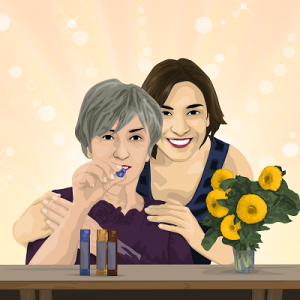 In homeopathy, the name of a disease or a symptom is not sufficient for the selection of a matching remedy. To select a curative remedy, you need to detect the conditions which make you feel better or worse. A condition which makes you or a symptom better or worse is called a modality.
In homeopathy, the name of a disease or a symptom is not sufficient for the selection of a matching remedy. To select a curative remedy, you need to detect the conditions which make you feel better or worse. A condition which makes you or a symptom better or worse is called a modality.
Modalities are one part of the complete symptom. The complete symptom is the detailed description of your complaint.
A modality can be as simple as fresh air or cold drinks. It could also be something very contradictive such as stomach pain which improves when drinking coffee or the aversion of company while being afraid of being alone.
Modalities let us distinguish one remedy from another.
There are hundreds of remedies which have caused a particular symptom in a proving. They differ in their modalities. Therefore modalities help you find the remedy which corresponds best to your symptom or condition.
Without modalities, it is nearly impossible to find the corresponding medicine.
So when searching for a remedy, you first need to find those that come up with the symptom you want to cure. From those preselected remedies, you select a remedy that is associated with the same modalities as your symptom.
Modality Categories
- Time (of the day, week (e. g. worse at 4 p.m., in the evening, in the evening in bed, before midnight, at night, at midnight, after midnight, early in the morning, 3 a. m., 4 a.m., a.m., after sleeping, before breakfast, after breakfast etc.)
- Seasons and time of the moon (spring, summer, fall, winter, dampness, humidity, full moon, new moon, changing moon phases, wind, East wind, North wind, etc.)
- Weather and air, temperature (humidity, wind, draft, dampness, cold, getting cold, warmth, weather changes, wrapping up and warm packs, a hot bath, fresh air etc.)
- Physical touch and pressure
- Position/posture (standing, getting up from sitting, getting up from laying down, sitting down)
- Motion (moving the body, moving a limb, turning the suffering limb, getting up from bed, rising sitting down, lying, bending, stretching, walking, jogging etc.)
- Body activity (coughing, singing, talking, sneezing, after sleeping, while eating, drinking smoking etc.)
- Sensory (odors, touch, noise, bright light)
- Psychological (from excitement, overwork, insult, trauma, being alone, being among others, mental efforts, anger, fright, fear, sudden loss etc.)






